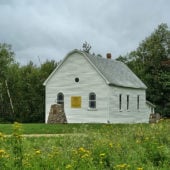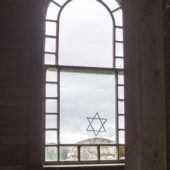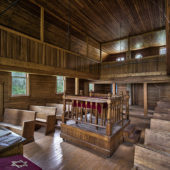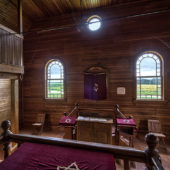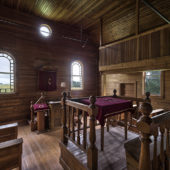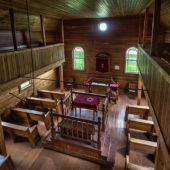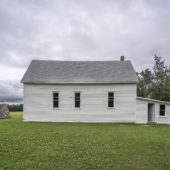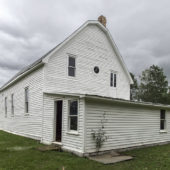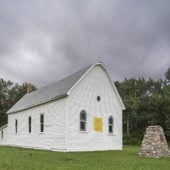The oldest surviving synagogue in the province of Saskatchewan.
Beth Israel Synagogue, including its adjacent cemetery, is a municipal heritage site as designated by the Rural Municipality of Willow Creek on September 10, 2003.
Located 15 miles up a dirt road from the community of Star City, Edenbridge was an agricultural colony established in 1906 by Jewish immigrants who came from Lithuania via South Africa. There are few traces of the remote settlement yet old Beth Israel synagogue still stands, maintained in pristine condition as a heritage site by the Provincial Government of Saskatchewan. It, is a fine example of Carpenter Gothic architecture with wooden structure and siding, a steep pitched roof and lancet windows. It is the oldest surviving synagogue in Saskatchewan. A relic of a bygone era, the synagogue is left unlocked for all to visit. When visiting with a Saskatoon native, we indicated surprise that a synagogue could be left open and unattended. She replied, “This is Saskatchewan, after all.”
A bronze plaque posted in front of Beth Israel reads: “On this site stood the Beth Israel Synagogue built in 1908 by a group of immigrants whose first settlers migrated from South Africa in 1906 to found the Edenbridge Hebrew Colony. For over half a century this institution served a thriving Jewish farming community which in the early 1920s numbered fifty families. The lure of urban life, the advent of farm mechanization, and father time all combined to reduce this once flourishing centre to less than five families. In 1964 the original synagogue ceased to operate as a place of worship.”
No one lives in Edenbridge any longer so we were delighted to visit with a native of the hamlet who now resides in Winnipeg. Well into his nineties, the spry Mr. Vickers told us that his father and uncle, who were bakers, immigrated to Canada in 1906 when they heard that the Province of Saskatchewan was offering 160 acres of land for $10.00. Vickers said, “What they did was unimaginable. They had no idea what a farmer looked like. They arrived by train in Star City (14 miles distant) and made life-long friends within a day or two. These people actually taught them to be farmers.”
At the land office, the brothers chose a quarter section (160 acres) near a river bank which they wanted to name Yid’nbridge or Jewish Bridge. The land agent discouraged that name so they named it Edenbridge. To earn the land, they had six months to clear it, make roads and improvements using oxen and hand tools. Prospering by growing wheat, barley and oats, the brothers traveled the 500 miles to Winnipeg to find and court Jewish wives. The two brothers married two sisters and the families thrived in Edenbridge. Eventually there were 53 Jewish families in the area. According to Vickers, “you couldn’t find a non-Jewish farmer until 1955.”
It was a hard frontier life with brutal Saskatchewan winters made endurable by the warm relationships centered about the synagogue. Vickers recalled that in the winter they used axes to dig graves and in the summer, when the roads were muddy, coffins used to fall off the wagon when it got stuck. Out of attachment to this special place some Edenbridgers have returned for burial. The latest gravestone in the cemetery is dated 2001. The people and their close-knit idyllic community are gone while the remarkable Edenbridge synagogue, cemetery and memories remain.

